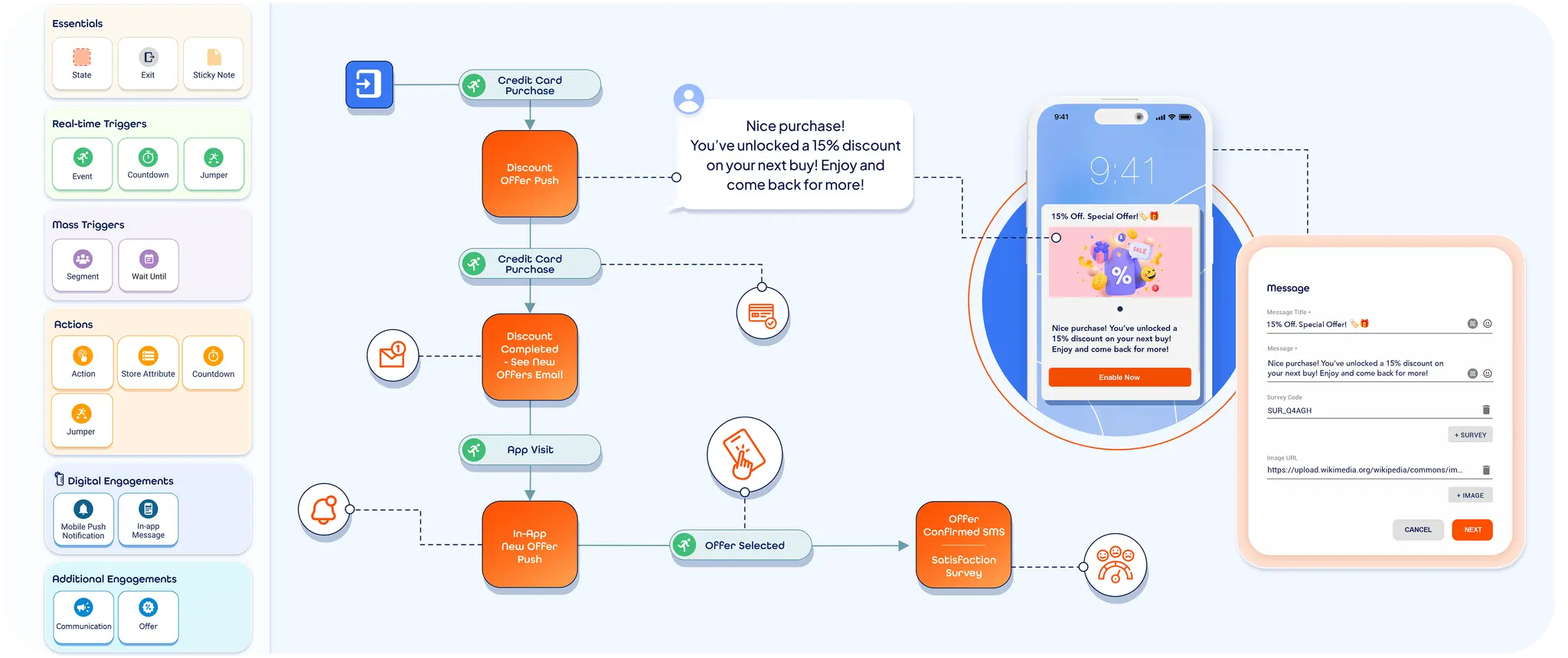Multichannel Marketing
What is Multichannel Marketing?
Multichannel marketing refers to the practice of engaging with customers across various channels to offer a consistent and seamless customer experience. These channels can include both physical ones, such as brick-and-mortar stores or printed ads, and digital ones, such as email, social media, in-app messages, websites, SMS, WhatsApp messages, or push notifications.. 
What are the Benefits of a Multichannel Marketing Strategy?
Embracing a multichannel marketing strategy can provide various benefits for businesses:
1. Wider Reach
By utilizing multiple channels, businesses can reach a larger and more diverse audience. People have different preferences, accessibility requirements, and consume information in various ways, so embracing a multichannel outbound marketing strategy ensures that businesses don’t miss out on potential customers.
2. Improved Customer Experience
Today’s customers often switch between multiple channels during their customer journey. Therefore, ensuring a seamless transition between channels and delivering a consistent message across all touchpoints enhances the overall customer experience.
3. Higher Conversion Rates
Being present on multiple channels increases a business’s visibility, which improves the likelihood of customers encountering and interacting with it. Businesses can also use one channel to promote their other channels, such as sending an email to notify customers of an in-store event, which could lead to higher conversions.
4. Increased ROI
Multichannel attribution in digital marketing helps determine how each marketing channel contributes to a customer’s decision-making process. Businesses can determine which channels are resonating with customers vs. which are underperforming, then balance their marketing budget accordingly. This data-driven resource allocation allows businesses to optimize their marketing strategies and maximize ROI.
5. Better Data Collection & Insights
A multichannel strategy enables businesses to gather customer data from different touchpoints. By analyzing customer data from various channels, businesses can create more targeted campaigns, deliver personalized content, and optimize messaging based on customer preferences and actions.
While the benefits of multichannel marketing are significant, it's important to recognize the challenges and considerations that come with embracing a strategy that spans multiple platforms.
What are the Challenges of Embracing Multichannel Marketing?
There are three key challenges businesses must overcome when adopting a multichannel marketing approach:
1. Consistency
Businesses must ensure that the information they share across all platforms is consistent and accurate. Furthermore, channels must be able to support customers switching back and forth between platforms without losing their progress in their customer journey. Misinformation or a lack of continuity between channels negatively impacts customer satisfaction and loyalty.
2. Information Overload
Customers receive daily notifications from various businesses they interact with. This barrage of notifications can get overwhelming, where customers choose to ignore messages before reading them, or unsubscribe from a business altogether. To prevent this, businesses must be selective with the interactions they have with their customers. Instead of utilizing all available channels to communicate information, businesses must adopt an optichannel approach and use only the most effective channels for each customer.
3. Data Integration
Collecting and analyzing data to understand customer behavior across multiple channels can be challenging, as many businesses have their data siloed across different platforms or tools. When data from various channels isn’t integrated, it becomes difficult to get a complete and accurate view of the customer profile and campaign performance.
The Role of a Marketing Platform in Implementing a Multichannel Marketing Strategy
A multichannel marketing software plays a crucial role in helping businesses manage, optimize, and automate marketing efforts across various touchpoints. Here are some of the benefits a platform could provide to a business:
1. Multichannel Marketing Automation
Businesses can automate marketing campaigns across multiple channels, such as email, social media, and SMS with the help of a marketing platform. Automation saves time, improves efficiency, and ensures timely delivery of messages.
2. Centralized Customer Data
Marketing platforms help gather data and provide real-time tracking of customer interactions from various touchpoints and integrate it into a single customer view. This allows businesses to track a customer's entire journey across channels, empowering them to make informed decisions.
3. Dynamic Segmentation
With the help of a marketing platform, businesses can segment their audience based on various criteria, such as demographics, behavior, preferences, or engagement history. This segmentation can help determine which marketing channels will perform better with each customer segment, allowing businesses to tailor their communications and marketing campaigns.
4. Personalized Content
Through dynamic segmentation and data analysis, marketing platforms can provide personalized messages, services, or products to different customer segments, enhancing the likelihood of engagement and conversions.
evamX: Streamlining Multichannel Marketing for Maximum Impact
evamX is an optichannel marketing platform that empowers businesses to optimize their multiple marketing channels and form meaningful connections with their customers.

Through its AI-powered capabilities and cutting-edge modules such as Digital Engagement, Insight Tracker, and Journey Designer, evamX is able to perform dynamic and contextual segmentation, automate marketing campaigns, and craft hyper-personalized customer journeys to create a consistent and seamless customer experience across all touchpoints.
Join the Evam Community
Subscribe to receive the latest insights, news, and updates straight to your inbox.


